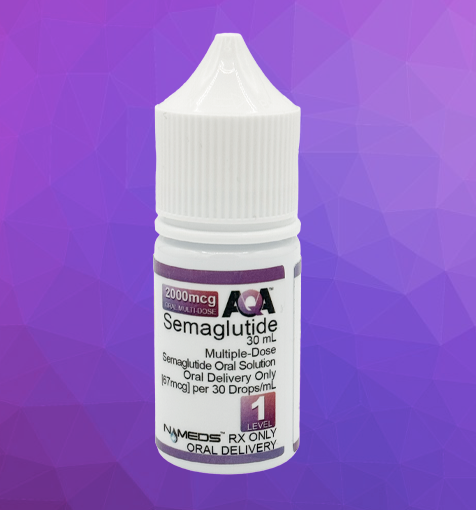ORAL SOLUTIONS FOR A BETTER YOU
AQA Products
RX Only

GLP-1 Semaglutide
Glucagon-like peptide 1 (GLP-1) is an incretin hormone that is released during a meal. Among its multifaceted functions is the ability to connect the absorption of nutrients from the gastrointestinal tract with pancreatic hormone secretion.[1] Semaglutide is a GLP-1 receptor agonist (GLP-1RA). It stimulates glucose-dependent insulin release from the pancreatic islets, reduces glucagon release, and promotes insulin secretion.[2] Semaglutide reduces appetite, stimulates satiety, and decreases ad libitum energy intake.[3] This medication should be taken on the same day each week, at any time and with or without food. To minimize gastrointestinal side effects, it is titrated up starting at 0.25 mg once a week with dose increases every 4 weeks until the full dose of 2.4 mg is reached.
Key Benefits
- Reduced fat and body weight
- Decreased hunger and cravings
- Compounded Injections for Oral Delivery
- Increased metabolism
- Lowered risk of heart disease
- Lowered blood sugar and blood glucose levels
Our Commitment
Our goal is to maintain leadership in delivering high-quality pharmaceutical care, emphasizing comprehensive and confidential services for patients throughout the entire healthcare spectrum one pharmaceutical ingredient at a time.


Before taking this medicine
You should not use semaglutide if you are allergic to it, or if you have:
- multiple endocrine neoplasia type 2 (tumors in your glands);
- a personal or family history of medullary thyroid carcinoma (a type of thyroid cancer); or
- diabetic ketoacidosis (call your doctor for treatment).
Tell your doctor if you have ever had:
- a stomach or intestinal disorder;
- pancreatitis;
- kidney disease; or
- eye problems caused by diabetes (retinopathy).
In animal studies, semaglutide caused thyroid tumors or thyroid cancer. It is not known whether these effects would occur in people. Ask your doctor about your risk.
Men and women should stop using semaglutide at least 2 months before you plan to get pregnant. Ask your doctor for a safer medicine to use during this time. Controlling diabetes is very important during pregnancy, as is gaining the right amount of weight. Even if you are overweight, losing weight during pregnancy could harm the unborn baby.
Ask a doctor if it is safe to breastfeed while using this Ozempic or Wegovy.
You should not breastfeed while using Rybelsus.
Semaglutide is not approved for use by anyone younger than 18 years old.
FAQ
How does semaglutide work?
Semaglutide works to lower high blood sugar by increasing the amount of insulin that is released, lowering the amount of glucagon released and by delaying gastric emptying. Semaglutide also controls appetite and so helps you reduce the amount of food that you want to eat. Semaglutide is a glucagon-like peptide-1 (GLP-1) agonist
How should I take semaglutide?
Dosing information:
What happens if I miss a dose?
What happens if I overdose?
Seek emergency medical attention or call the Poison Help line at 1-800-222-1222. Overdose may cause severe nausea, vomiting, or low blood sugar.
emaglutide side effects
Get emergency medical help if you have signs of an allergic reaction: hives, itching; dizziness, fast heartbeats; difficult breathing; swelling of your face, lips, tongue, or throat. Serious side effects of semaglutide may include: call your doctor at once if you have: vision changes; unusual mood changes, thoughts about hurting yourself; pounding heartbeats or fluttering in your chest; a light-headed feeling, like you might pass out; signs of a thyroid tumor–swelling or a lump in your neck, trouble swallowing, a hoarse voice, feeling short of breath; symptoms of pancreatitis–severe pain in your upper stomach spreading to your back, nausea with or without vomiting, fast heart rate; gallbladder problems–upper stomach pain, fever, clay-colored stools, jaundice (yellowing of the skin or eyes); low blood sugar–headache, hunger, weakness, sweating, confusion, irritability, dizziness, fast heart rate, or feeling jittery; kidney problems–swelling, urinating less, feeling tired or short of breath; or stomach flu symptoms–stomach cramps, vomiting, loss of appetite, diarrhea (may be watery or bloody). Common side effects of semaglutide may include: low blood sugar (in people with type 2 diabetes); upset stomach, heartburn, burping, gas, bloating; nausea, vomiting, stomach pain, loss of appetite; diarrhea, constipation; stomach flu symptoms; o headache, dizziness, tiredness. This is not a complete list of side effects and others may occur. Call your doctor for medical advice about side effects. You may report side effects to FDA at 1-800-FDA-1088.


